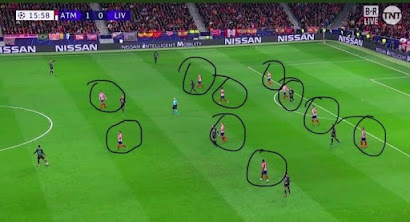Tactical Breakdown: Parking the bus.
PARKING THE BUS.
What does it mean to ‘Park the bus?’
A football team Parks the Bus by deploying outfield players in a defensive setup, in an attempt to prevent the opposition from scoring goals to either hold a draw or preserve a lead. This can be achieved by organising the players into defensive lines to be compact and force the opposition to carry out a more patient build up.
This style usually restricts creativity by:
- Blocking passing lanes
- Reducing spaces for opponents that attempt penetrating runs towards the goal
- Forcing opponents to attempt low percentage shots i.e. from outside the box or from tight angles which can be greatly inefficient
Image 1. Atletico Madrid’s defensive setup against Liverpool, two compact defensive lines of four and two player to lead the counterattack.
Why do teams “Park the bus?”
The successful implementation of this style would allow the defending team to prevent the opposition from scoring due to limiting the amount of chances from which they can score.
But why do teams choose to park the bus?
Teams that consider this strategy usually consider the quality of attacking players within the opposition team to be a major threat and park the bus in hopes of getting a result out of the game, in their favour. Football is about moments. Jose Mourinho has stressed that during a game, you are not always in control, sometimes you can be dominated. During this period of being dominated, parking the bus is an option to help cope and can lead to counter attacks. This is an effective measure due to the number of players the attacking team would have in the attacking half, along with the high line they may maintain to commit bodies to moving the ball in hopes of getting through the rigid defensive lines. This means, when utilising this strategy, one or two attacking players can be positioned ahead of their defensive lines so as to exploit the spaces left by the opposing team. Hence, once possession is won, a designated ball-playing defender or midfielder with a wide range of passing would look to release the attacking players in hopes of hurting the opposition on a counterattack.
Another reason for the use of this tactic could be to obtain a result in cup competitions over two-legged ties, involving a home and away fixture for each team. That is, should one team hold an advantage going into the return fixture, parking the bus may seem a viable option. But is it that simple?
Parking the bus really isn’t just sitting back and stacking up numbers on the amount of balls cleared and shots blocked. The strategies and roles organised by the coaching staff along with the commitment, focus, determination, heart and belief of the players will all be tested until the final whistle. One mistake can be costly: one misplaced pass, one unmarked player, one passing lane left open or one deflected shot off an overly committed defender. It must be perfectly executed.
Surely one can be frustrated after the team they support suffers on the offensive end against rigid defences utilizing this style but before dismissing the tremendous work by the players and coaches alike, appreciate the style. Low-scoring football games may be considered boring or dull but take heed of the quote by Sir Alex Ferguson - “Attack wins you games, Defence wins you titles.”
Opinions vary on whether this style is considered anti-football or a masterclass in the defensive end. What do you think?



Comments
Post a Comment